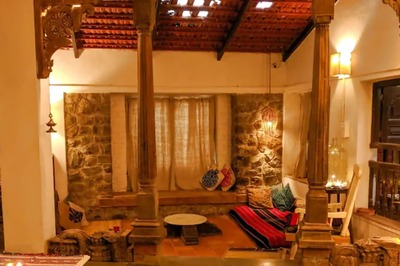
views
New Delhi: India’s largest Central University is conducting its annual election for the Delhi University Students’ Union (DUSU) and one can catch the whiff of excitement as soon as one gets off the metro at the Vishwavidyalaya Station. Paper ballots and posters are strewn all over the road and walls. National Political parties extend their presence within the ‘campus community' with student organisations running at their behest.
Students across campus are engaging in heated discussions regarding which party would get their vote, who has a better chance of winning and why the Chandrayaan-2 landing might have failed.
Considered one of the most significant student body elections, DUSU is known to have kick-started the political careers of veterans such as Arun Jaitley, Vijay Goel and Ajay Maken.
Many believe that DU elections present a microcosm of the general political mood of the country. Ever since Narendra Modi-led BJP government’s thumping victory in 2014, its student wing, the Akhil Bharatiya Vishwa Parishad (ABVP), has dominated the DUSU polls, winning the coveted post of the president four out of five times. With ABVP ruling the students union, national issues have slowly started dominating the students’ minds, making the campus environment much more political than before.
Over the past five years, the national political climate has had a gargantuan impact on the functioning of student politics in Delhi University. Prior to this, the political leanings on campus based itself on softer issues which were mostly impulsive in nature. In today’s time, clear lines of demarcation on the basis of political leanings have been drawn across campuses.
“Since 2014, issues from outside the campus have suddenly become more important. Modi slogans can be heard during rallies. This time, the ABVP has been asking for votes in the name of Kashmir and Chandrayaan. These elections have become like a referendum on the present government,” says Amitrajeet Mukherjee, an M.Phil student who has been living in the campus since 2013. He says the National Students’ Union of India (NSUI) has followed in the footsteps of the ABVP and discusses similar issues.
Mukherjee believes the Jawaharlal Nehru University (JNU) protests of 2016, where three students, including the JNU students’ Union president Kanhaiya Kumar were arrested on charges of sedition, were a watershed moment for student politics in India. “Suddenly, your political leanings became important. Before the JNU incident, everyone in the campus was very cynical about politics but after that it became part of a larger battle. Even incidents of ragging reduced significantly as students were more interested in politics,” he says.
In 2017, student leader and Ph.D scholar from JNU, Umar Khalid, along with Shehla Rashid were invited to Ramjas College to address students in an academic seminar. After protests by the ABVP, the invitation had to be cancelled. This led to massive clashes between members of ABVP and All India Students’ Association (AISA). The political sentiment in DU has been charged up ever since. There was a saturation of space for those who mutually and respectfully ‘agree to disagree’.
Due to these occurrences, the political spectrum across Delhi University has witnessed a massive change over the years which has had an almost direct effect on the campaigning strategies adopted by student parties. However, there still remains a vast number of students who are unaffected by national politics or its impact on student elections in DU.
In this case, parties have to engage in age-old campaigning tactics to attract the non-partisan crowd.
On one hand, parties are actively seen addressing topical issues happening across the nation to garner attention and mandate through dialogue and dissent. And on the other hand, DUSU elections have also gained infamy over the years due to notorious campaigning techniques to catch students’ attention.
Be it humongous hoardings, paper pamphlets strewn all across the university campus or distribution of freebies like chocolates and movie tickets, the student bodies adopt all kinds of methods to fetch votes.
Students residing in the vicinity of campus have claimed to have received all kinds of goodies (from pizzas to alcohol) delivered right to their doorstep as ‘gifts’ from DU’s in-house political aspirants.
Behind the façade of aggressive campaigning and freebies, one may overlook the actual purpose of these elections. On one hand, those who emerge victorious with popular mandate tend to exercise immense power in campus affairs. On the other hand, political parties take keen interest in the outcome of these elections in order to determine the political mood of the young (mostly first-time) national voters.




















Comments
0 comment